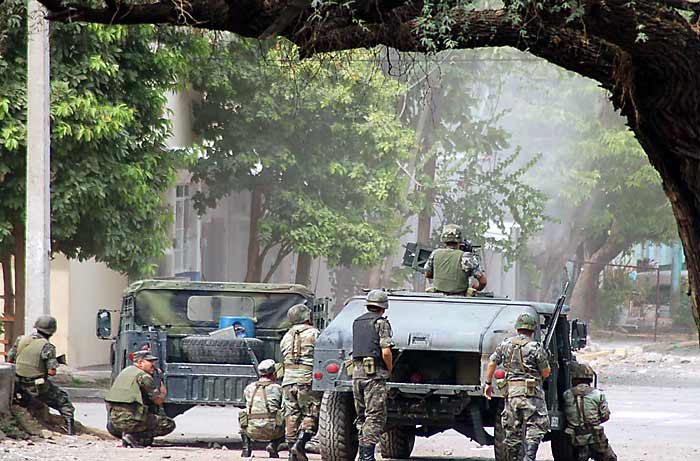Violence and drug trafficking in Mexico is perhaps one of the few topics that every academic and journalist has heard about. Every week, if not every day, the Mexican and international media are flooded with information about confrontations between rival drug-trafficking organizations and government security forces, and the resulting unfortunate loss of human lives. The latest notorious case is the disappearance and-–already officially confirmed–-murder of 43 college students in Guerrero, Mexico, a case that has been concisely summarized by Trevor Stack on the Conversation and many others in different news outlets and international blogs.
Due to the extensive coverage of this issue, this post is a different one in that it attempts to incentivise a more analytical approach to the conflict. And for this, I want to start by reaffirming something that seems to have been lost among the latest articles published: violence is not an isolated condition nor a spontaneous challenge to the government; its repercussions and origins heavily lie on the lack of effective protection of human rights, including freedom of speech.
For many years, leading theorists from Habermas to Calhoun have agreed that the public sphere, of which freedom of speech is an essential component, is a necessary condition for democracy. For it to be effective though, citizens need to be exposed to rational-critical arguments and a free media in a socio-political scenario that permits deliberations and contestation—conditions still nowhere to be found fully in place in certain parts of Mexico. According to the Freedom House Index, Mexico is now internationally regarded as a “Partly Free” country where press is “Not Free”, while the Reporters Without Borders press freedom index ranks it 148th out of 180 countries for its level of freedom of speech. The above, many would argue, is perfectly demonstrated by the recent dismissal of Carmen Aristegui, a renowned journalist in Mexico, from the national news-radio company “MVS Radio”. MVS says Aristegui’s removal was in response to administrative and disciplinary faults of the journalist and her team. Society in Mexico, though, perceives something different. They consider this an authoritarian response from President Peña Nieto’s administration to Aristegui’s findings on the “white house scandal”, which involved Mexico’s First Lady and the President himself. Citizens have been taking to the streets to protest what they consider is governmental censorship. Although this case has attracted a considerable amount of international media attention, it is, regrettably, neither a unique case nor the most severe one demonstrating Mexico’s lack of freedom of speech.
Different from the government’s intervention in Aristegui’s case, in Michoacan, a state in western Mexico considered one of the drug traffickers’ strongholds, a tangible, noticeable and violent force constrains the media. This violent force regulates what is published and consequently, dominates, if not abolishes, the public sphere. Not only does this impede the region’s democratic advancement, it proves that commonly accepted theoretical assumptions do not perfectly fit in Michoacan’s case. Although it tends to be correct to assume, as Brambila and many others do, that media-–mainly traditional media–-can protect and save lives; in Apatzingan and Uruapan, Michoacan, the question is: who protects and saves the media for it to then save lives?
Through their international coverage, media organisations like the BBC, CNN and Al Jazeera have attracted considerable international attention to the drug-trafficking problem in Michoacan. Contrary to existing scholarly assumptions, the qualities, challenges and social impact of local and national media cannot be placed in the same group as international media. In words of “M”, a journalist from a local newspaper in Uruapan, “reporters from national and international media outlets conduct research, write an article and return home. They arrive, even agree with them on creating a shooting scenario, and it was great news for them; but we live this daily. Local journalists stay, live in the area of conflict, are identified and become targets.” Hence, in order for us citizens, scholars and analysts to expect and demand a more critical, unbiased, fair, and open work from the media, we firstly need to differentiate and understand the specific context under which particular media outlets are immersed.
In the case of-–at least–-Apatzingan and Uruapan, Michoacan, the power of criminal organisations grew to the extent that the drug lords were able to produce and enforce their own “media guidelines” over the newspapers in the region, my contact explained.
By dictating how photographs of murdered people should be taken, which words and how many to use in articles, the level of detail and depth of news reports, and even the article’s positioning within the newspaper, these groups have made the local media look like “the most stupid journalists in the world; everybody in the streets knew what was happening, when and where, and we were not reporting it,” said “M”. The simple reason being that Mexican journalists needed to privilege human life over information.
The above makes evident that, as any other group in power, drug traffickers knew, and still know that by controlling the flux of information they can sustain their illegal reign.
“Keep working, while you work aligned to us, there will be no problem,” they told a reporter from Apatzingan. Thus, while the State cannot provide basic conditions of security—much less justice—the main question for those local journalists remains, as “M” said: “should we follow the indications from the federal government about denouncing a crime or should we comply with [the drug-traffickers’] guidelines that keep us alive?”
Jose Angel García is a PhD researcher at the University of Sheffield. He has written on Mexico for the Crick Centre, Open Democracy, and Political Insight. Find out more here.

Reply